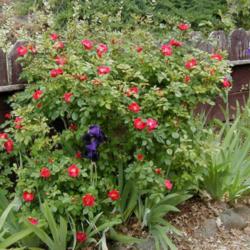Rick ...
>>>I usually get grit from the local coop, farm store, feed store, grain elevator, or tractor store
Thank you. The Ace Hardware store up here does not carry this kind material, nor does the one down in the valley, but I can find a farm store, feed store or tractor store down in the valley.
>>>>I don't know why you want to use only non-organic materials for roses or other perennials (not alpines). That's what they like. That's what soil flora likes. That's the best way to hold nutrients. That's the easiest way to improve soil structure. The benefits go on and on.
The answer is twofold ... 1) This was my first in-ground garden and I didn't know I couldn't create a rose garden. 2) I know roses. I didn't learn about them the way the traditional gardener learns about roses, but from the breeders of roses. In order to "play" with them, I had to learn the history of roses, the species roses ... many of which are found in alpine areas ..., the lineage of roses, the botany of roses and what they need to thrive. I know that roses are regional and what plant characteristics are required to survive and thrive in my garden. I've shovel pruned all of the roses that did not have those characteristics. I had been gifted with 150 roses, in bands, when I purchased this home as a housewarming gift. (Many of those roses were totally wrong for this garden.) I have worked on a rose database for more than ten years and learned about roses that I would have never found in a regular rose nursery.
I had had hands-on experience with probably more than a 1000 different cultivars by volunteering to work in rose nurseries and public gardens. I have first hand experience in learning how roses are produced in the fields, processed and ultimately marketed.
I am a novice gardener who happens to know more about roses than the average gardener.
>>>> Yes, it does settle, so your initial build will include a higher grade than what you want in the end. And if you don't periodically add organic materials to you soil that naturally break down, you will end up with tired soil that roses and perennials won't like.
Very true. I mulch twice a year, and often more during the heat of the summer, if the mulch breaks down too quickly. But over the years, with continuous mulching, watering properly and, yes, the addition of chemical nutrients, I have improved the native "soil" sufficiently so that it is far more viable. When I first started this garden, it would have been easier to use a jackhammer to dig my rose holes than to use a hand mattock. I perk tested each hole before planting. I didn't know I was supposed to prepare a whole bed. I can now dig in any of the rose beds with a trowel.
I did know that I didn't want raised beds because I didn't want the straight lines ... this house had far too many straight lines to please my eye ... and I didn't want to haul all of the material up from the street bed.
Since my first roses sunk, I quickly learned that when I back filled a planting hole, not to use organic material except in the top 10 inches because that is where the plant's feeder roots are located and to mound up the planting hole area, so that when it sunk, it sunk to the level I wanted for the rose. I also try to copy the native soil structure that was naturally there with a transition area between the potting soil where that held the roots of the rose I was planting.
One things I knew about roses is that I had to grow a larger root mass before planting because this allowed the plant to survive the stress in adapting to less than ideal conditions. All organic materials go on top since I am mimicking nature. Nature does not bury organic materials around the root base of plants. Nor do I.
>>>You'll need to add fertilizers on a regular basis, and that will degrade the natural balance of soil flora, too.
Yup. Not only fertilizers but also other nutrients/elements required to improve the performance of the plants. My soil is magnesium deficient and I have added magnesium sulfate to the planting areas. I also give the roses a kick start in spring with calcium nitrate.
Watering deeply and widely the day before feeding with any NPK fertilizer, or anything like calcium nitrate, allows the nitrate to stay within the root zone of the plant longer and to be available for the plants to take up more than would be possible without that practice.
Here's a photo of a rose that was planted in soil that was not amended with organic material before planting. In my opinion, it looks like it is doing quite well.
>>> For plants that don't normally grow in in rock substrates, composty materials are practically cure all amendments.
I am not sure what you mean by the above statement.
Smiles,
Lyn
